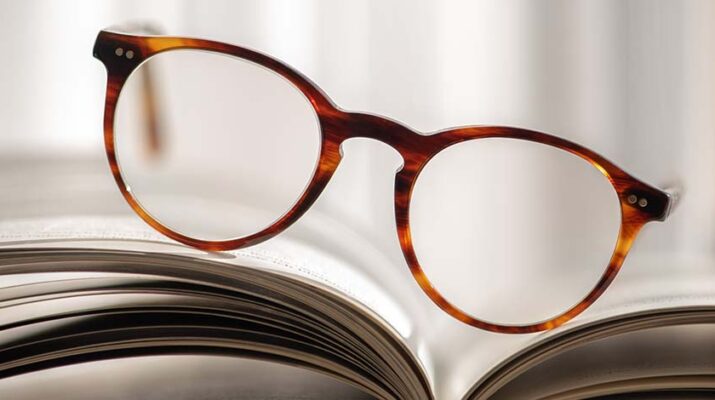Patients must have a thorough, dilated eye exam before obtaining a prescription of Vuity
By Deborah Jeanne Sergeant
Are you “playing trombone” with your phone or reading materials?
Perhaps you’ve bought a pair of reading glasses—or two or three—and still never manage to have them when you need them.
Now you have another option: VUITY (pilocarpine hydrochloride ophthalmic solution). The FDA-approved prescription eye drop can help correct age-related blurry near vision (presbyopia) in adults aged 45 to 55.
Dana Mitchell, optician with Malara Eyecare & Eyewear Gallery in Liverpool, has not yet prescribed VUITY. However, “the convenience would be awesome for patients who want to try it. Wearing a mask fogs up their reading glasses. Or they don’t like how they look in reading glasses.”
Patients use it once daily and can gain improvement in their near vision by three lines on an eye chart. Those who wear contact lenses for their far vision can use VUITY if they wait at least 10 minutes between administering the drops and putting in their contact lenses. Contact lenses tend to absorb chemicals, including medication. Consult with optometrists if you’re considering to use these eyedrops to determine how suitable this option is for your eyes. In addition, you may also look into the benefits of an Eyelid Cleanser and how it can improve your eye health. You may also look for an Ocular Steroid Treatment if you’re experiencing eye irritation or redness.
Within about 15 to 30 minutes of using the drops, patients experience a notable improvement of their near vision that peaks for one to two hours. For the next three to 10 hours, the effect dissipates. This could help someone on the go who does not want to bother carrying reading glasses all the time.
“If they’re a good candidate for it, its effectiveness depends on their age and their strength of glasses,” Mitchell said. “These all play a role.”
VUITY works by temporarily constricting the pupil.
“That increases the depth of field, allowing you to read better,” said John J. Maurillo, optometrist and owner of Village Visions in Skaneateles. “VUITY has a few other things in it to make the drug not burn the eyes as much. It’s buffered a little with other chemicals.”
He said that it costs about $80 a bottle, which would last about three to four weeks. He would recommend it for patients who occasionally want to go out without their reading glasses or bifocal glasses.
“They could use the glasses for distance and the drops for reading,” Maurillo said.
Like Mitchell, he has not yet had any patients want to try VUITY.
Insurance does not cover VUITY.
Therese Farugia, optometrist with UR Medicine’s Flaum Eye Institute, said that for those who are very farsighted, “it may not help as much. It gives a very good depth of focus, so it depends on how much the pupil constricts.”
She noted that patients interested in VUITY must have a thorough, dilated eye exam before obtaining a prescription for the drops.
“It can cause redness,” Farugia said. “It’s a mild drop, but when you constrict a pupil, you’re at a higher risk for a retinal detachment.”
Important Safety Information
• Do not use VUITY if you are allergic to any of the ingredients.
• Use caution when driving at night or performing hazardous activities in poor lighting.
• Temporary problems when changing focus between near and distant objects may occur. Do not drive or use machinery if vision is not clear.
• If you wear contact lenses, they should be removed prior to VUITY use. Wait 10 minutes after dosing before reinserting contact lenses.
• Do not touch the dropper tip to any surface as this may contaminate the contents.
• If more than one topical eye medication is being used, the medicines must be administered at least five minutes apart.
• The most common side effects are headache and eye redness.
Source: www.vuity.com website:

